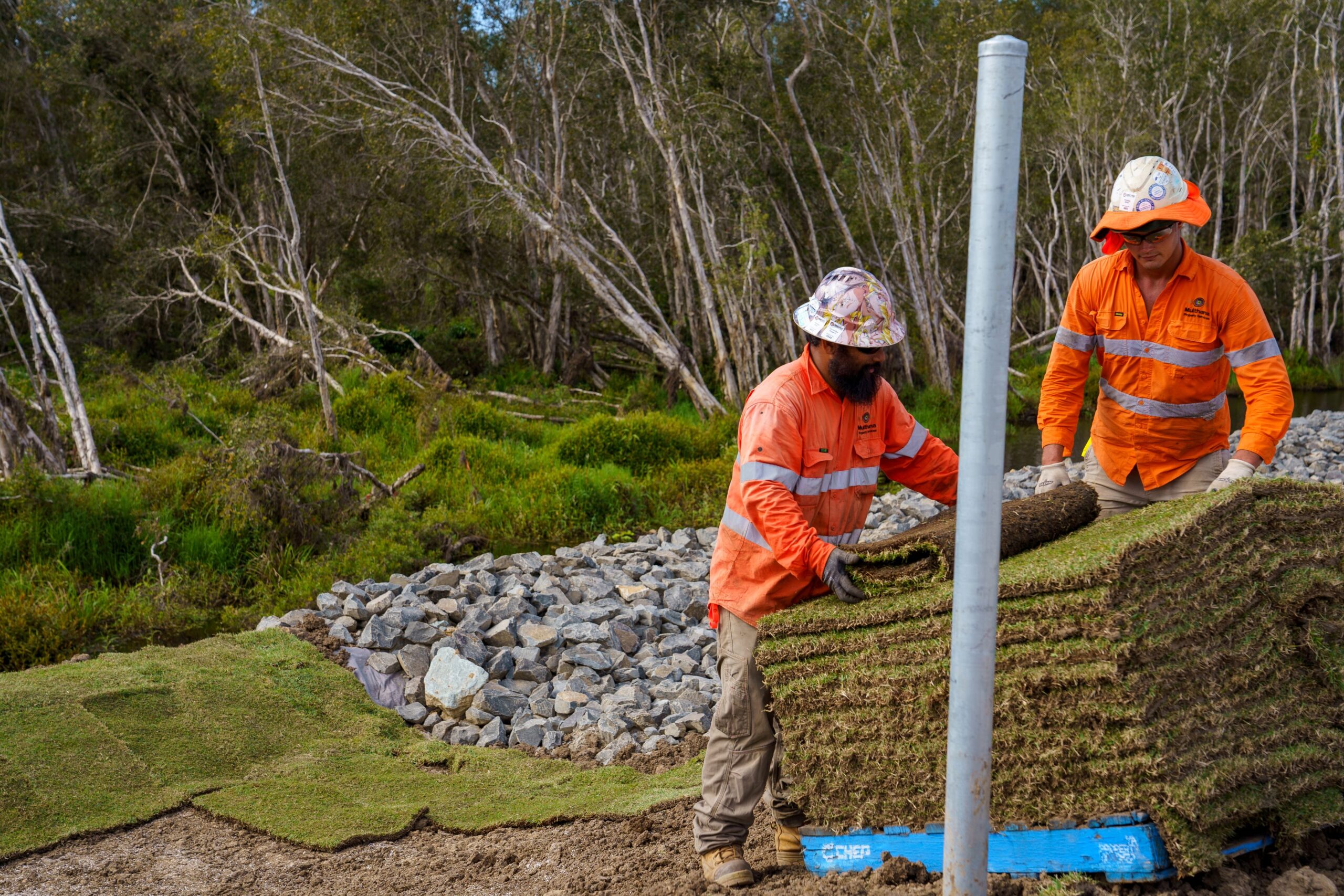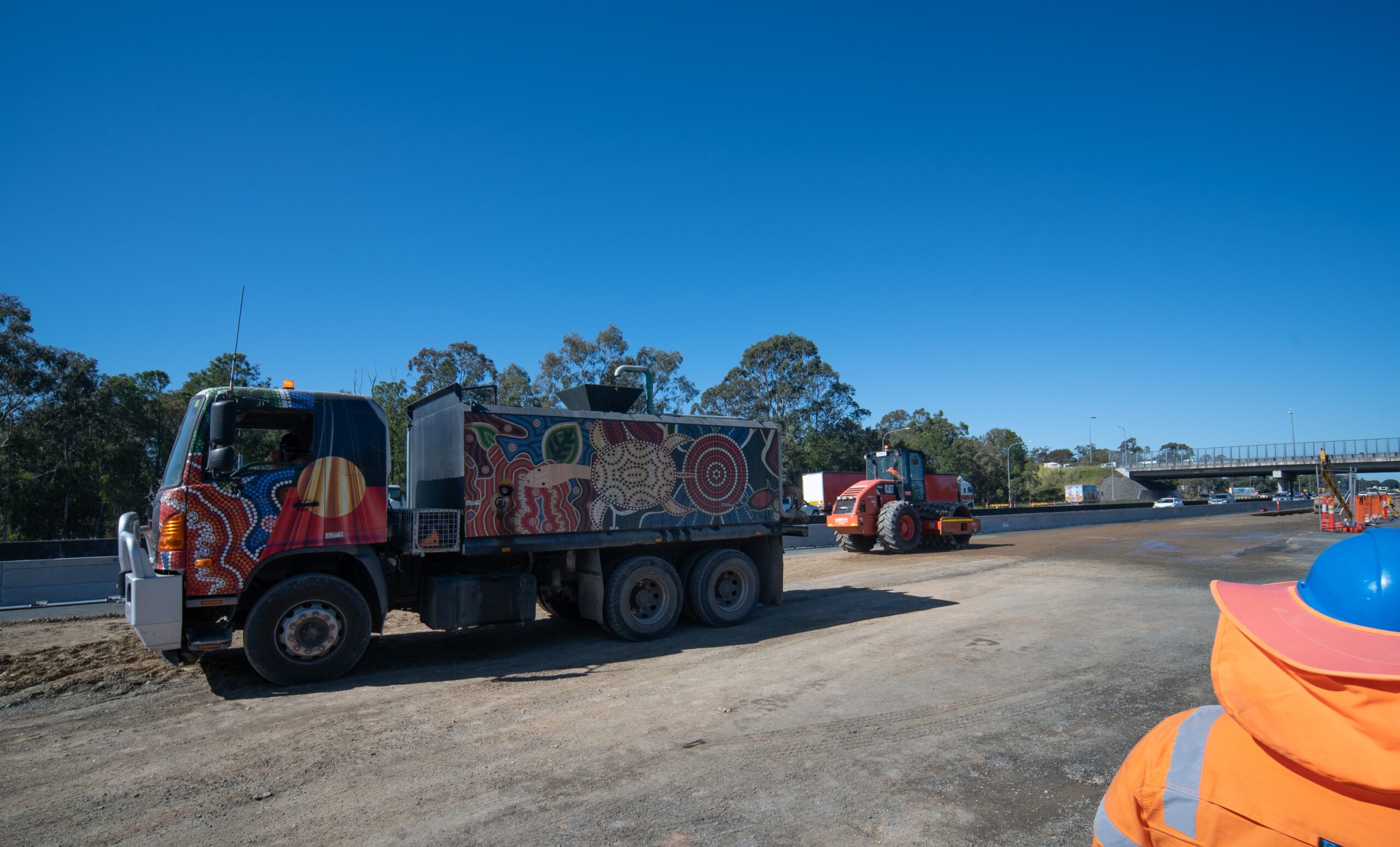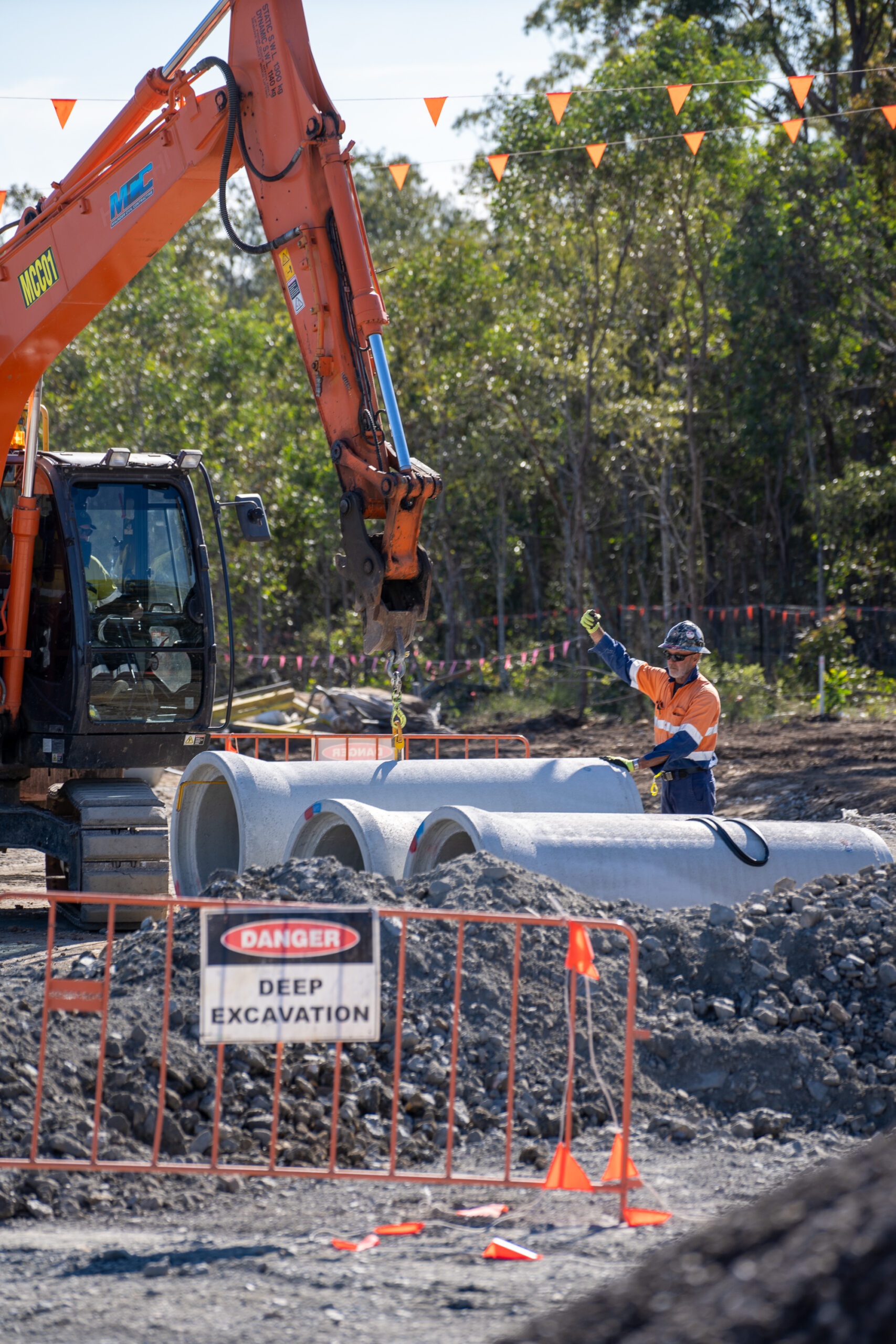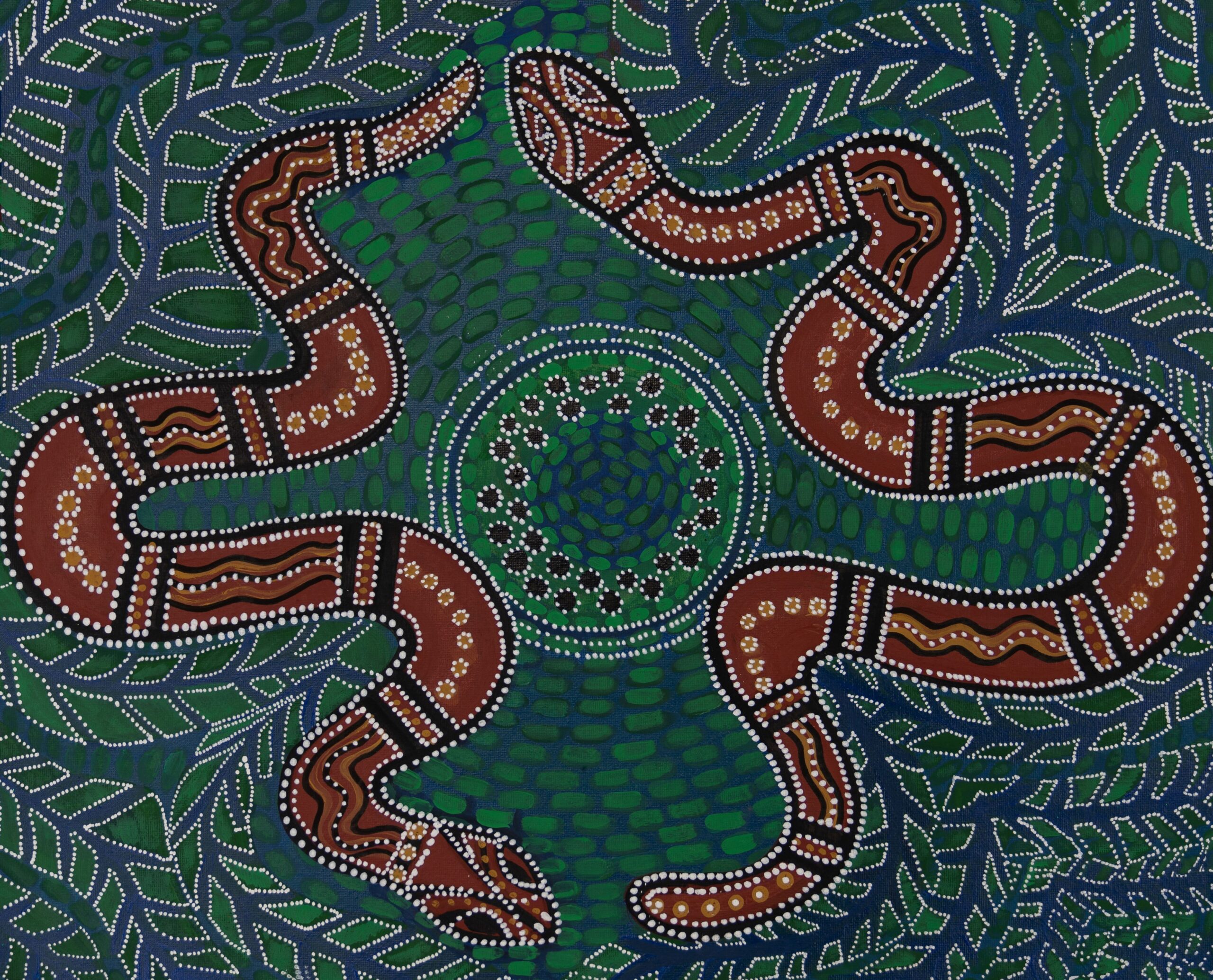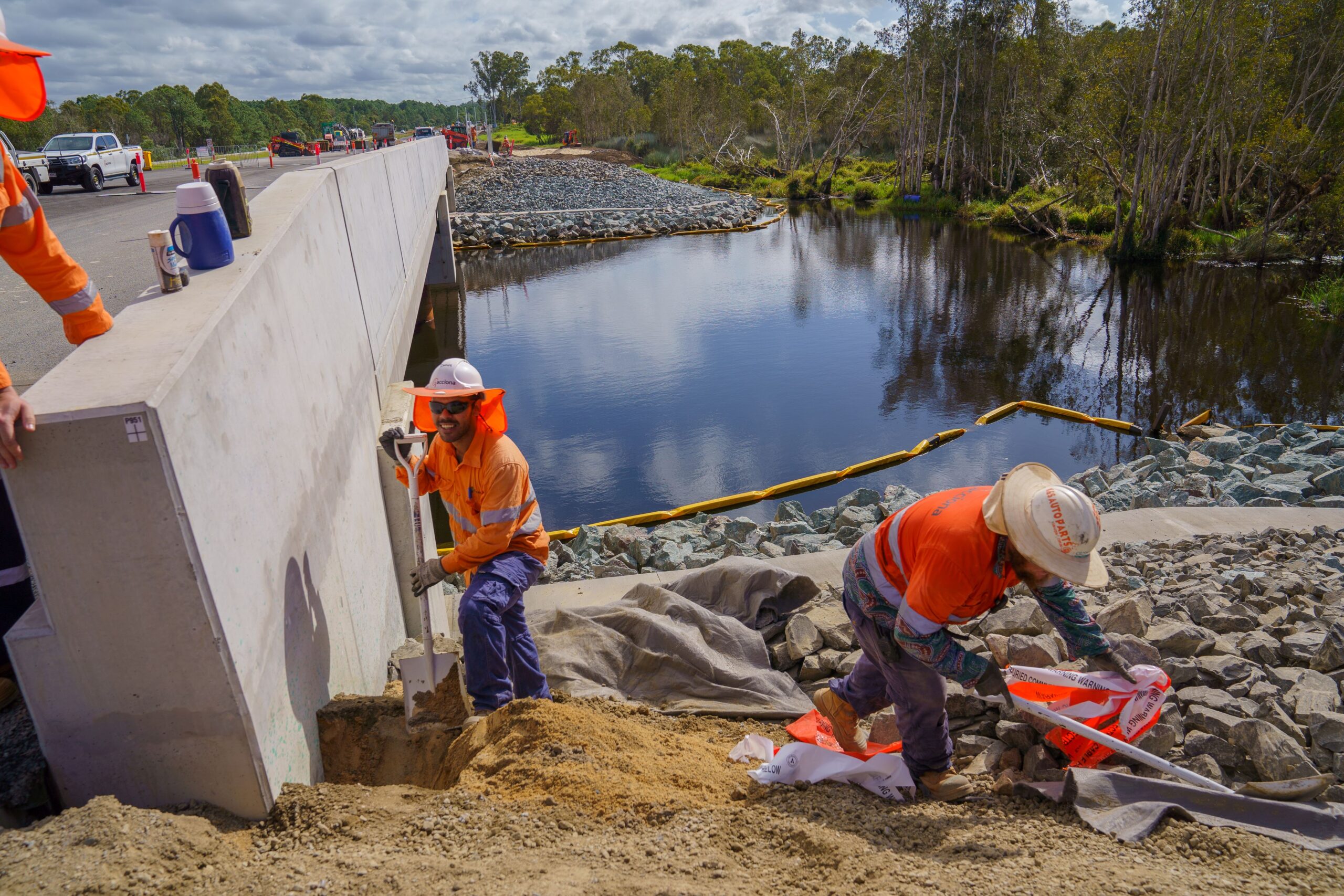Bruce Highway Upgrade – Bribie Island Road to Steve Irwin Way (Exit 163) Project – Social Outcomes
Describe WHAT you have done and HOW you have done it.
The Queensland Government is upgrading 11km of the Bruce Highway between Caboolture and Steve Irwin Way, as part of a $662.5m program to reduce congestion and improve flood immunity.
The Bruce Highway Upgrade: Caboolture-Bribie Island Road to Steve Irwin Way (Exit 163) Project (C2SIW) is split into two contracts, with Acciona Construction (ACCIONA) delivering Contract 1 (C2SIW-C1) between Caboolture-Bribie Island Road and Pumicestone Road, on behalf of the Department of Transport and Main Roads.
The C2SIW-C1 Project has adopted a proactive strategy to surpass compliance standards and achieve positive social outcomes for employees, trainees, subcontractors, suppliers, and Indigenous Australians.
As a state government-funded project valued over $100 million, the Project is subject to minimum training compliance requirements pursuant to the Qld Building and Construction Training Policy, which aims to develop the industry’s skills base and future workforce capability. The C2SIW-C1 team must ensure a minimum 15% of the total labour hours are completed by new entrant apprentices and/or trainees.
In addition, the Project is a recipient of federal funding (>$7.5m) and subject to minimum Indigenous employment and business participation requirements, applicable to the National Indigenous Employment and Supplier-use Infrastructure Framework (National Indigenous Framework). Under the framework, C2SIW-C1 must engage supplier businesses that are >50% Indigenous-owned to a minimum of 3% of the total Contract Value.
The C2SIW-C1 Project team embraced these requirements and worked collaboratively to ensure the delivery of social outcomes were not only met, but vastly exceeded in the planning, design and delivery of works. These actions have led to positive social and economic outcomes for employees, trainees, subcontractors, local suppliers and Indigenous Australians.
ACCIONA’s approach to leveraging success from knowledge gained in the delivery of previous infrastructure projects, has resulted in verified measures being implemented early in the set-up and establishment of the C2SIW-C1 team. ACCIONA’s internal sustainability knowledge group, established to facilitate collaboration across States and Territories, shared key findings from ISC rated projects, subject to similar training and/or Indigenous engagement requirements.
C2SIW-C1 assigned a dedicated Training Coordinator to define and implement a Social Legacy Action Plan that would exceed the Project’s social procurement requirements. Elements of the plan include:
• Skills Development Plan defining the training scope, needs and skills for trainees/apprentices and existing workers
• Engaging early and developing partnerships with a Group Training Organisation, Registered Training Organisations, and the Australian Apprenticeship Support Network
• Engaging early with Construction Skills Queensland to secure Industry Skills Coordination Program funding and support for the project’s training needs
• Functional leads assigned accountability to identify workforce training opportunities for staff across accredited and non-accredited training
• Engaging early with subcontractors during tender reviews and work package award to identify opportunities and mandate recording/reporting
• Online Training Hours and Indigenous Participation Tracking Register to provide monthly progress updates.
The result was a doubling of new entrant hours, near doubling of Indigenous business spend, and Indigenous employment hours that exceeded target by more than 750%, all of which led to positive social and economic outcomes for employees, trainees, subcontractors, local suppliers and Indigenous Australians.
What were the OUTCOMES and how were those outcomes shared?
Industry Capability and Inclusion:
The Project’s focus on boosting industry capability will assist the Queensland construction industry to address workforce shortages expected in the next five years.
The Project is proud to have achieved:
• 197% new entrant hours (80,291 of a total 40,675 required hours)
• 429% other workforce hours (118,506 of a total 27,116 required hours)
• High trainee retention rates, with:
o 100% retention of ACCIONA trainees
o 100% retention of labour hire trainees
o 57% retention of Indigenous trainees.
Behind the statistics are real-life examples of individuals undertaking career- and life-changing training. Tara Smulders joined C2SIW-C1 as a full-time apprentice, following a 19-year career in hairdressing. Tara’s career objectives shifted in 2021, with an ambition to grow professionally and work outdoors, as she pivoted her career to construction.
Tara was employed by Protech Group and supported to complete a Certificate III in Civil Construction Traineeship which saw her placed full-time on the C2SIW-C1 site. The majority of Tara’s training was completed in the field, with support from ACCIONA’s site crew, whom she says took her under their wing, answering questions and nurturing her through her role. Tara successfully completed her traineeship with Protech in July 2022 and was immediately employed by ACCIONA on a permanent full-time basis. Tara has remained on C2SIW-C1 for the duration of the project. Tara’s persistence, motivation, accountability and dedication is an asset to the industry and a role model for future women in construction.
Indigenous Economic Development & Recognition:
The Project has actively supported the employment, training, skills development and supply chain opportunities directly benefitting Indigenous Australians and businesses.
The Project is proud to have achieved the following:
• 869% Indigenous employment hours (39,309 hours of a total 4,519 required)
• 173% goods/services procured from majority Indigenous-owned businesses ($5,221,743 of a total $3,012,912, which equates to 3.4% of C2SIW-C1’s contract value)
• 21 Indigenous personnel employed in variety of roles including engineers, foremen, labourers, plant operators, traffic controllers, landscapers and site administrators (13% of the total workforce)
• 10 Indigenous trainees employed (4% of total trainees)
More than $5 million of significant work on C2SIW-C1 was completed by businesses with majority Indigenous ownership, including:
• Maunder Civil Contracting Pty Ltd – +$2.5m drainage works + wet plant hire
• Multhana Property Services – +$1.3m landscaping works
• McKay Water Carts and Street Sweepers – +$350k plant hire
• Danda Property – +$650 general form REO pour.
• Dreampath Recruitment – +$200k trainee and labour hire solutions
ACCIONA’s C2SIW-C1 team worked closely with Indigenous-owned Maunder Civil Contracting, during procurement and letting of sub-contracts, with the aim to increase the economic independence of this local small business. Maunder was initially contracted to deliver a <$500k drainage works package, however the team quickly proved themselves through quality, efficiency and reliability, and the scope expanded to include wet plant hire to a value of $2.5 million. This certainty of work allowed Maunder to establish strong industry partnerships and expand its fleet.
ACCIONA C2SIW-C1 also worked closely with Indigenous-owned Multhana Property Services, contracted to deliver a +$1.3 million landscaping package. At the time, it was the company’s largest landscaping contract and their first TMR project. The team focussed on supporting and mentoring Multhana staff to ensure success on-site. The positive outcomes of Multhana’s work created local employment opportunities for 15 Indigenous employees and importantly proved a legacy-building opportunity for the company, having successfully gone on to win new contracts on two other ACCIONA projects.
Respect and connection to Country:
The Project worked to foster an inclusive, respectful and culturally safe workplace culture. An initiative that highlights this commitment was the commissioning of Indigenous artwork to use on high-visibility uniforms worn by the workforce.
The commissioned original artwork titled “Place of the Carpet Snake” was painted by local Kabi Kabi Elder,
Melissa Bond, and tells the story of the carpet snake dreaming that involves the meeting of two carpet snakes that carved their paths across country to meet near the Caboolture River.
The team engaged with the Indigenous supply chain ‘Terri Janke and Company’ and Indigenous workwear supplier ‘Commercial Bunji’ to bring this opportunity to life. The uniforms served as a conversation-starter, raising awareness of and pride in local connection to Country, promoting recognition and unity.
Describe WHO benefited from your initiative, innovation, or approach?
The Project committed to a Social Legacy Action Plan early in project establishment to deliver measured social outcomes in training and Indigenous participation. The team’s approach supported new entrants, identifying meaningful pathways for trainees, and has actively contributed to increasing diversity, capability and depth of skilled resources to improve the resilience of the construction industry.
Staff and Workforce Outcomes:
A total 80,291 hours (97% above target) were contributed by apprentices and trainees, new to the industry. A further 116,506 hours (329% above target) were delivered in broader workforce training. This demonstrates serious commitment from the C2SIW-C1 team to improve training outcomes - establishing a legacy for the Queensland construction industry to address many of the workforce shortages.
Tara Smulders is just one example of a Project employee who has benefited from C2SIW-C1’s commitment to supporting trainees. Tara’s successful pivot from a 19-year career in hairdressing to construction demonstrates the success of new pathways being created through active engagement.
Indigenous workforce and businesses:
Multiple local Indigenous owned businesses, employees, trainees and suppliers benefitted from the structured assistance and planning. A total of $5.2 M (value) of goods and services (including hours) was invested and procured from majority Indigenous-owned businesses. This equates to 3.4% of C2SIW-C1’s contract value and a 173% achievement against the National Indigenous Framework minimum target. 21 Indigenous personnel were employed on the Project in varying roles, ten of whom were trainees.
The opportunities presented to Indigenous Australians have assisted with economic growth locally and regionally. The team has developed meaningful partnerships with Indigenous employees, businesses and suppliers. The training, career and skills development, support, and guidance provided to Indigenous trainees and apprentices has helped nurture the next generation of skilled workers across civil construction.
Traditional Owners:
In its commitment to reconciliation, positive relationships were established with Traditional Owners, the Kabi Kabi First Nation People. The Project engaged 15 Kabi Kabi Cultural Heritage Monitors to deliver targeted Cultural Heritage and Awareness Training to staff, employees and sub-contractors. Commissioning of Indigenous artwork and subsequent use on the Project’s high-visibility uniforms served as a visible, respectful and proud symbol of connection to Country, and a way to bridge the knowledge gap.
The C2SIW-C1 project’s commitment to reconciliation was recognised at a state level in 2022 when the project was selected as one of four finalists in the Premier’s Queensland Reconciliation Awards partnerships category.
What LEGACY and UN SDG CONTRIBUTION was achieved?
Legacy:
The C2SIW-C1 Project’s commitment to training and Indigenous participation has established ongoing legacies for individuals and businesses. Tara Smulders’ success story will no doubt inspire and give others confidence to follow their dreams and push themselves to break down social and cultural barriers.
Successfully engaging with Traditional Owners and Indigenous-owned businesses has led to additional opportunities for Maunder Civil Contracting and Multhana Property Services. ACCIONA has assisted with establishing strong foundations for businesses to expand and continue further opportunities for local Indigenous workers.
ACCIONA’s approach to diversifying its workforce and engaging with Indigenous subcontractors is setting new standards across the Queensland construction industry. Early planning, collaboration, engagement and monitoring were lessons learnt from previous projects. The C2SIW-C1 Project is a leading example of how major projects can create opportunities to train and upskill employees, new entrants and trainees and leave a legacy for all to benefit from a diverse and culturally safe workplace.
In September 2022, ACCIONA was recognised as an ABA100 Winner for Training Excellence in the Australian Business Awards 2022 for C2SIW-C1, having exceeded Training and Indigenous Participation compliance requirements. The project was also a finalist at the Premier’s 2022 Queensland Reconciliation Awards (Partnerships category) and the 2023 QMCA Awards for the category of Sustainability and Community
UN SDG Contribution relating to Social Aspects:
SDG1 - No Poverty:
Queensland is home to the nation’s second-largest Aboriginal and Torres Strait Islander population. Underpinned by the Path to Treaty and Local Thriving Communities reforms, the Queensland Government is committed to reframing the relationship with Aboriginal and Torres Strait Islander Queenslanders, working to address historical and ongoing economic and social injustices, and recognising First Nations peoples’ sovereignty and right to self-determination.
The C2SIW-C1 Project has successfully connected with the next generation of First Nations business leaders, by working with and supporting investment into the growth of majority Indigenous owned businesses and creating pathways for diversity; to achieve long-term social and economic outcomes for Queensland’s First Nations peoples.
SDG4 - Quality Education:
The project has provided work opportunities for new entrants to the construction industry, and invaluable training opportunities for all. The summary of achievements is as follows:
• 80,291 hours (97% above target) contributed by new entrant apprentices and trainees
• 116,506 hours (329% above target) undertaken in other workforce training.
SDG8 - Decent work and economic growth:
C2SIW-C1 Project team has worked hard to support the growth of First Nations businesses, critical to Closing the Gap. The Project achieved the objectives of the Social Legacy Action Plan, providing employment opportunities for community groups, people and businesses:
• 99% of project spend with local south-east Queensland businesses
• 21% based in the local Moreton Bay Regional Council area.
SDG10 - Reduced Inequalities:
The project nurtured a positive relationship with Traditional Owners, the Kabi Kabi First Nations People, undertaking Cultural Heritage and Awareness Training, engaging 15 Cultural Heritage Monitors and commissioning Indigenous artwork to display on project uniforms. In total, 21 Indigenous personnel were employed on the project, contributing 39,309 hours (769% above target).
All achievements mentioned above have been shared to the Client and wider industry through various channels, including internal and external reporting, internal and external newsletters and newsfeeds, and through award submissions.
[embed]https://vimeo.com/844450001/43352f03b2?share=copy[/embed]

